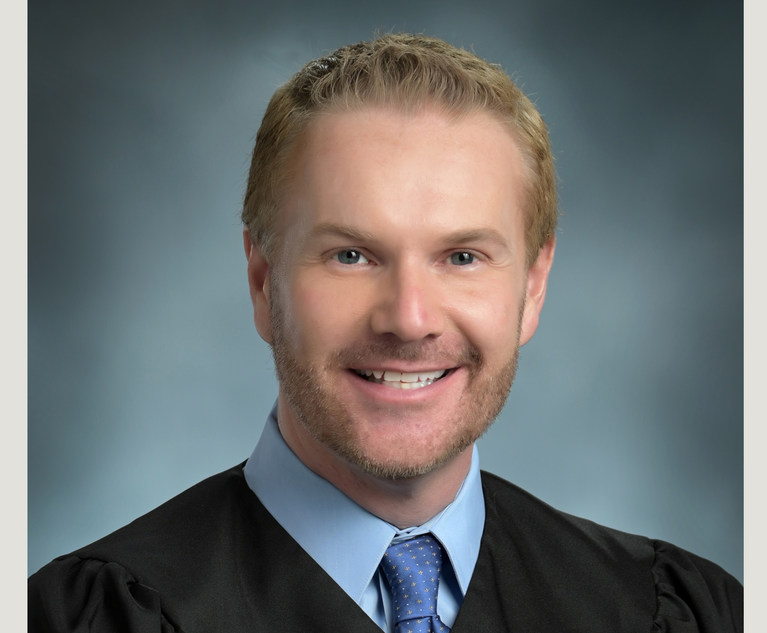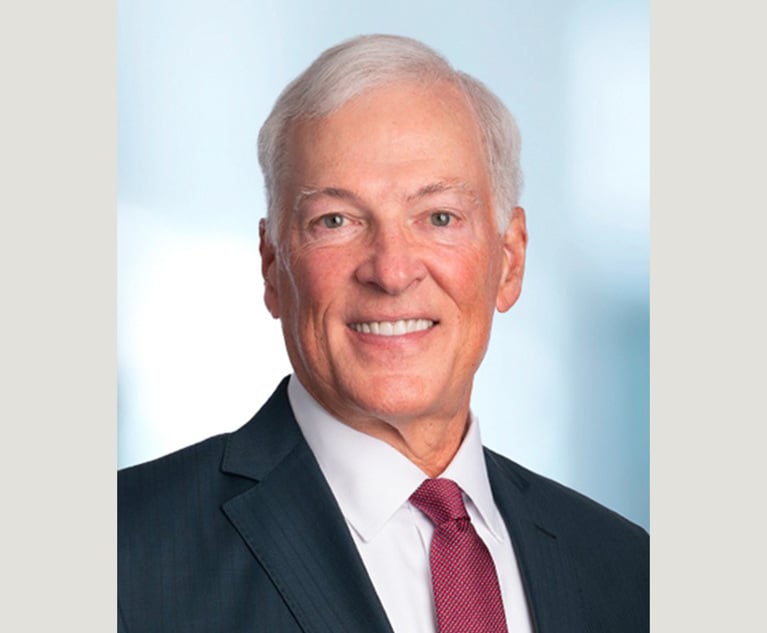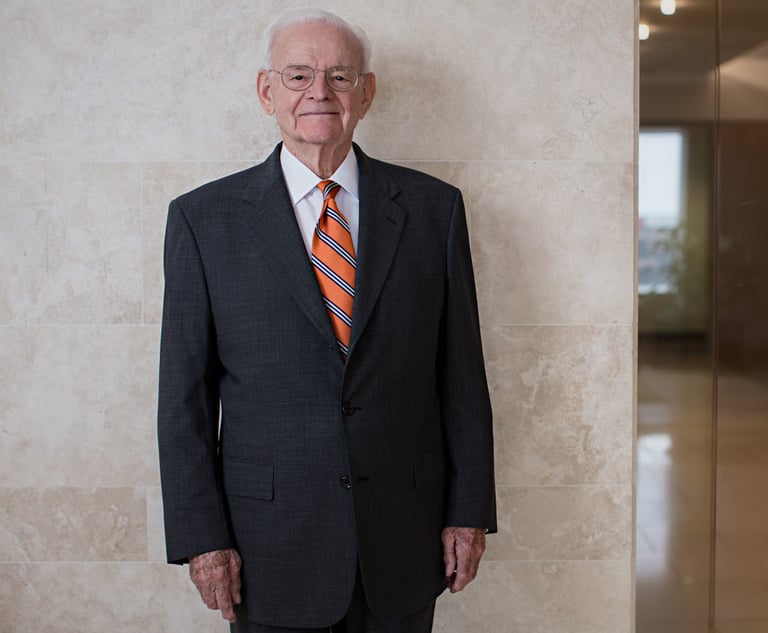 Judge David Spurgeon of the Allegheny County Court of Common Pleas. Courtesy photo
Judge David Spurgeon of the Allegheny County Court of Common Pleas. Courtesy photo Judicial Candidate David Spurgeon Says Internet Defamation Is a Growing Threat to the Legal Profession
"We have seen the use of social media distorting factual information and topics becoming 'viral,'" said the Commonwealth Court hopeful, who is currently a judge on the Allegheny County Court of Common Pleas.
October 14, 2021 at 03:06 PM
8 minute read
On Nov. 2, Pennsylvanians are set to decide which candidate will join the ranks of the state Commonwealth Court. To get a better understanding of each candidate's background and judicial philosophy, The Legal has asked each to respond to a questionnaire touching on a variety of topics important to the legal community.
Responses to the questionnaires are set to be published in the weeks leading up to the general election. The first installment comes from the campaign of candidate David Spurgeon, judge of the Allegheny Court of Common Pleas.
The following has been lightly edited for style.
The Legal: How would you describe your judicial philosophy?
Spurgeon: Judge Spurgeon does not identify with the "judicial philosophies" defined because most are a reflection of political ideology. Politics should not come into play in the courtrooms of Pennsylvania. Judges must appear and remain neutral, impartial and nonpartisan. Judge Spurgeon's personal judicial philosophy is to strive to ensure that everyone has access to the courts; that all parties have the opportunity to be heard and believe that they have the opportunity to prevail; and that all parties are treated equally, fairly and in a trauma-informed courtroom setting.
The Legal: What two decisions or cases are you most proud of, and why? Conversely, what two opinions or cases would you like to take back or revise if you could, and why?
Spurgeon: Because most of the cases that Judge Spurgeon hears involve children, they are not published in a traditional way for privacy concerns to protect the parties. Accordingly, the decisions Judge Spurgeon is most proud of involve children in the foster care system. Judge Spurgeon has made decisions that required the government to provide more resources to children than regulations require. He is proud that he examines each pending matter on a case-by-case basis and ensures that the needs of all children are met. Judge Spurgeon is a national expert in the area of domestic violence and presides over Protection From Abuse Orders. Judge Spurgeon is proud of the decisions that he makes in these types of cases and incorporating this issue in all cases relating to family violence.
Anyone that sits in judgment of others knows that hindsight is 20-20. In cases where kids are placed in foster care, there have been proceedings where parents have promised to do things in order to regain custody. Judge Spurgeon has given parents additional opportunities to remedy the issue that brought the child(ren) into care. Unfortunately, not all parents that promised to resolve an issue followed through and that may delay a child from receiving permanency.
The Legal: In your view, what makes you the best candidate for the role?
Spurgeon: Judge Spurgeon is proud to be the only candidate that received the top rating of "highly recommended" for Pennsylvania Commonwealth Court by the Pennsylvania Bar Association—a nonpartisan group comprised of attorneys and community members across Pennsylvania. The Commonwealth Court handles many case types and is unique because this appellate court also sits as a trial judge in certain cases.
Judge Spurgeon was an accomplished trial lawyer and spent nearly 19 years in the Allegheny County District Attorney's Office, where he tried some of the most heinous cases of abuse. He was the youngest deputy district attorney and also prosecuted dozens of homicide cases. He was a champion of treatment courts and assisted in the creation of Veterans' Court and supervised the attorneys in Mental Health Court. He also worked on systems improvements within the courts and was named a national judicial fellow for his judicial leadership. Judge Spurgeon has served as a trial judge for over five years and presides over cases involving children, our most vulnerable population.
He has a proven track record as a trial lawyer, which propelled him to be a successful trial judge. He serves as an adjunct professor of law at Duquesne University School of Law and has been recognized by the Allegheny County legal community for his public service. A former union member with the United Steelworkers, he would bring a unique perspective to the Commonwealth Court that presides over cases involving labor issues.
The Legal: What is the greatest threat to the practice of law, or problem the profession faces?
Spurgeon: One issue of rising concern is the use of the internet to discredit attorneys. We have seen the use of social media distorting factual information and topics becoming "viral." A friend who is an attorney recently had a former client make false allegations about the result of his criminal case, which spread to social media forums. The attorney received physical threats from anonymous participants as well as having the location and a photograph of the family home posted. Supporters of the disgruntled client bombarded websites where people can post attorney reviews. The attorney struggled communicating with the websites' administrators in order to prevent further damage to the attorney's professional reputation.
The Legal: What does your party membership say about you and your legal outlook?
Spurgeon: In Pennsylvania, judges are elected and not appointed. Because one must run for election, you must run with a particular political designation. Generally speaking, most people join the political party with which they most identify. It is unlikely that any candidate agrees on all issues with their chosen party. Judge Spurgeon's personal outlook should not interfere with his oath to support, obey and defend the constitution.
The Legal: Do you think courts in Pennsylvania have a perception problem when it comes to appearing partisan? If so, what would you do to combat this?
Spurgeon: Because the courts are usually the final stop for most things relating to the government, it is imperative that citizens have faith in the judiciary. Because judges are elected in Pennsylvania, there is a natural consequence that partisan politics may spill over into the judiciary. For this reason it is even more important that judges reaffirm that our courts belong to everyone regardless of political affiliation. And like other situations, one should abide by the judicial canons that whenever their is the appearance of impropriety one should recuse themself from the case.
The Legal: Did Joe Biden, Josh Shapiro, Stacy Garrity and Tim DeFoor win free, fair and above-board elections in 2020, or do you think the contests were significantly impacted by fraud?
Spurgeon: Because election cases are decided in the Commonwealth Court, I am unable to answer this question due to the judicial canons.
The Legal: What factors matter in deciding when recusal is necessary, and would you recuse yourself if a campaign contributor were involved in litigation as a party or attorney before you?
Spurgeon: Yes. The judicial canons are explicit as to when a judge should recuse. As a sitting judge, I have recused myself despite being able to be fair and impartial but wanted to avoid the appearance of potential conflict to our citizens. I am fortunate to serve in Allegheny County where there are 42 other commissioned judges able to hear a recused case.
The Legal: How important is consensus—particularly unanimous consensus—in appellate court opinions and are there limits when a judge should only concur, or should they do it any time they feel like it?
Spurgeon: There should be unanimous consensus when it is in fact unanimous. Although the victorious party may seek a full agreement among the judges, a dissenting opinion also has legitimacy. Although the numbers of dissenting opinions continue to increase, a dissenting opinion allows an appellate judge to preserve their own personal independence. It also protects the transparency of the judicial process by holding the majority accountable for a final result.
The Legal: Who are your role models and mentors?
Spurgeon: Although I have many role models and mentors in my own family, including my 101-year-old grandmother that I provide care, professionally there have been numerous people. Throughout my career, there have been law professors, attorneys and judges that have impacted my legal practice in various ways. Duquesne University president Ken Gormley was a new constitutional law professor, who also came from the same region that produced steelworkers and not lawyers. He provided guidance and support throughout my law school days and later became the dean of Duquesne Law School. During his tenure as dean, he hired me to become an adjunct law professor, and I continue to serve in that capacity.
While honing my skills as a prosecutor, I was fortunate to be chosen to become part of a new trial unit supervised by Christopher Connors. Chris taught me many things that helped make me a better trial lawyer, but also was a gentle reminding force of the power the prosecution holds in the criminal justice system and the immense obligation it bears. Chris also identified my interest in improving the court system for the community and gave me the permission needed to effectuate real changes. Chris was promoted to first assistant in the office, and I ultimately replaced him as the supervisor of the Domestic Violence trial unit. I spent the next seven years modeling my supervisory and interpersonal skills from his example.
The Legal: In light of the recent constitutional amendments approved by voters, what is the courts' role in defining or limiting the emergency powers of the governor and General Assembly?
Spurgeon: I am unable to answer that question because of the prohibitions by the judicial canons. Cases before the Commonwealth Court include disputes between branches of the government as well as constitutional referendums/amendments.
NOT FOR REPRINT
© 2025 ALM Global, LLC, All Rights Reserved. Request academic re-use from www.copyright.com. All other uses, submit a request to [email protected]. For more information visit Asset & Logo Licensing.
You Might Like
View All
Superior Court Directs Western Pa. Judge to Recuse From Case Over Business Ties to Defendant
3 minute read
Saxton & Stump Lands Newly Retired Ex-Chief Judge From Middle District of Pa.
3 minute read
'Discordant Dots': Why Phila. Zantac Judge Rejected Bid for His Recusal
3 minute read
Judge Louis C. Bechtle: An American Jurist Who Relied on Common Sense, Sound Judgment and Fairness
5 minute readTrending Stories
- 1LexisNexis Announces Public Availability of Personalized AI Assistant Protégé
- 2Some Thoughts on What It Takes to Connect With Millennial Jurors
- 3Artificial Wisdom or Automated Folly? Practical Considerations for Arbitration Practitioners to Address the AI Conundrum
- 4The New Global M&A Kings All Have Something in Common
- 5Big Law Aims to Make DEI Less Divisive in Trump's Second Term
Who Got The Work
J. Brugh Lower of Gibbons has entered an appearance for industrial equipment supplier Devco Corporation in a pending trademark infringement lawsuit. The suit, accusing the defendant of selling knock-off Graco products, was filed Dec. 18 in New Jersey District Court by Rivkin Radler on behalf of Graco Inc. and Graco Minnesota. The case, assigned to U.S. District Judge Zahid N. Quraishi, is 3:24-cv-11294, Graco Inc. et al v. Devco Corporation.
Who Got The Work
Rebecca Maller-Stein and Kent A. Yalowitz of Arnold & Porter Kaye Scholer have entered their appearances for Hanaco Venture Capital and its executives, Lior Prosor and David Frankel, in a pending securities lawsuit. The action, filed on Dec. 24 in New York Southern District Court by Zell, Aron & Co. on behalf of Goldeneye Advisors, accuses the defendants of negligently and fraudulently managing the plaintiff's $1 million investment. The case, assigned to U.S. District Judge Vernon S. Broderick, is 1:24-cv-09918, Goldeneye Advisors, LLC v. Hanaco Venture Capital, Ltd. et al.
Who Got The Work
Attorneys from A&O Shearman has stepped in as defense counsel for Toronto-Dominion Bank and other defendants in a pending securities class action. The suit, filed Dec. 11 in New York Southern District Court by Bleichmar Fonti & Auld, accuses the defendants of concealing the bank's 'pervasive' deficiencies in regards to its compliance with the Bank Secrecy Act and the quality of its anti-money laundering controls. The case, assigned to U.S. District Judge Arun Subramanian, is 1:24-cv-09445, Gonzalez v. The Toronto-Dominion Bank et al.
Who Got The Work
Crown Castle International, a Pennsylvania company providing shared communications infrastructure, has turned to Luke D. Wolf of Gordon Rees Scully Mansukhani to fend off a pending breach-of-contract lawsuit. The court action, filed Nov. 25 in Michigan Eastern District Court by Hooper Hathaway PC on behalf of The Town Residences LLC, accuses Crown Castle of failing to transfer approximately $30,000 in utility payments from T-Mobile in breach of a roof-top lease and assignment agreement. The case, assigned to U.S. District Judge Susan K. Declercq, is 2:24-cv-13131, The Town Residences LLC v. T-Mobile US, Inc. et al.
Who Got The Work
Wilfred P. Coronato and Daniel M. Schwartz of McCarter & English have stepped in as defense counsel to Electrolux Home Products Inc. in a pending product liability lawsuit. The court action, filed Nov. 26 in New York Eastern District Court by Poulos Lopiccolo PC and Nagel Rice LLP on behalf of David Stern, alleges that the defendant's refrigerators’ drawers and shelving repeatedly break and fall apart within months after purchase. The case, assigned to U.S. District Judge Joan M. Azrack, is 2:24-cv-08204, Stern v. Electrolux Home Products, Inc.
Featured Firms
Law Offices of Gary Martin Hays & Associates, P.C.
(470) 294-1674
Law Offices of Mark E. Salomone
(857) 444-6468
Smith & Hassler
(713) 739-1250





